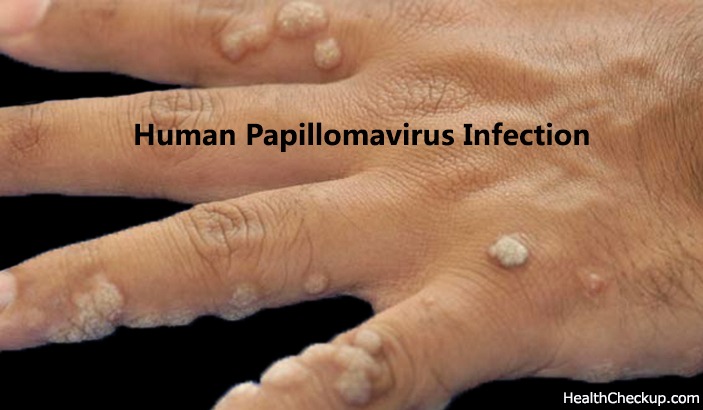Human Papillomavirus Infection, the most common sexually transmitted infections, infects 80% of the people at some point of their lives. It is a viral disease, transmitted through direct skin contact. Even if a person is infected, it is difficult to know, unless the symptoms show up. However, HPV Infection may lead to serious complexities and even cancer if it persists. Cervical cancer, genital warts and cancer in anus, vagina and vulva are the common consequences of HPV infection.
HPV has more than a hundred varieties, but the focus is laid on the ones affecting the genitals, throat and mouth. Even if a person maintains a protected sexual life with a few partners in bed, it is difficult to restrict the infection. The reason is that Human Papillomavirus Infection does not necessarily spread through sexual intercourse it can spread through oral sex as well. There are rare cases that the virus has been transmitted from the mother to the baby during delivery.
Symptoms of Human Papillomavirus Infection
The mucous membranes are the common dwelling places of the virus. They show up in various forms of warts. These can appear singularly or as clusters. Genital warts may appear long after sexual contact with an infected person, as they remain suppressed for a long time.
In most of the men and women, the immunity system of the body is strong enough to diffuse the ill-effects of the Human Papillomavirus Infection. Still, if the system gives in, various types of warts may appear in the body. The intensity of the infection depends on the type of virus that has infected the system. Long term negligence of warts can cause cancer.
Most Common Warts That Are Caused by The Virus
Genital Warts:
Genital warts resemble flat lesions or stem like projections, small in size. In some cases, they appear as bumps in a cauliflower. Though these warts are itchy, they seldom cause pain. In women, these warts may appear in the cervix, anus, vagina or the vulva. In men, the scrotum and penis are prone to infection by the virus.
Common Warts:
Common warts occur in both men and women due to Human Papillomavirus Infection. These can cause a certain degree of discomfiture or even bleeding. The areas around the fingers, hands and elbows develop these warts. They have raised bumps, rough in texture.
Plantar Warts:
These warts cause considerable pain in walking, as they appear on the heels or feet. These have a grainy texture and are hard in nature. Plantar warts are common in both men and women.
Flat Warts:
Flat warts can be identified by their colour, as they are slightly darker than the normal colour of the skin. These are slightly raised growths on your skin, with flat surfaces. However, these warts, caused by Human Papillomavirus Infection appear in different areas of the body, depending on the age and gender. While they appear on the face in children, warts may show up in the beard region in men and legs in women.
How is The Human Papillomavirus Transmitted?
As the virus spreads through direct contact of the skin, tiny tears in the skin, cuts and abrasions are the most common means of transmission.
-
As the disease is contagious, people coming in contact with the wart can easily be infected by the virus. In certain cases, genital warts in women grow too large, blocking the delivery canal. Although rare, they can be transmitted during the birth of a child. Oral sex and unprotected sexual intercourse are the most likely causes of Human Papillomavirus Infection.
-
The punctured areas of skin are more prone to infection by the disease. In other cases, people who have already been suffering from AIDS can be infected by the disease, as their immune system has already become weakened.
-
After organ transplants, doctors prescribe immune system suppressing drugs, which leverages the possibilities of the infection. Children, adolescents or young adults, both male and female, are prone to the virus.
- Having multiple sex partners also results in the easy transmission of Human Papillomavirus Infection.
Treatment For Human Papillomavirus Infection
Protection
Precaution is the best way to stay safe from the infection. Besides having protected sex, it is necessary to avoid direct skin contact with a person who has multiple sex partners. One can use dental dams while having oral sex to reduce the chances of infection.
Vaccination
The HPV vaccine is recommended for eleven to twelve-year-old children. Previously there used to be three doses of the vaccine, but presently medical advancements have reduced it to two. There has to be an interval of 6 to 12 months between the two doses. People can undergo vaccination against Human Papillomavirus Infection till the age of twenty-six.
The HPV test is available only for women, but no test has been innovated to detect the virus in men. As for the treatment, there is no specific remedy for the infection. If the body’s immune system is strong enough, the infection subsides on its own. Regular medical checkups are necessary to keep a track of the infected cells that may lead to cancer. However, even if warts disappear, the virus may linger in the skin-membranes for longer durations. There are certain standard therapies to do away with genital warts, but one cannot get rid of the virus unless it leaves the body.
How to Keep Yourself Safe?
Evidently, it appears that prevention is the best way to stay away from Human Papillomavirus Infection. Since no permanent remedy is available to treat the disease, it can be reduced through protection as much as possible. Factors indicating the time required for warts to subside on their own include the number, size, morphology characteristics of the patients and so on.
If you find any symptom that may lead to the infection, especially warts in the genital area, go for a check-up at the best hospital in your city immediately. Avail the vaccination if you have not got it yet. A medical test can detect Human Papillomavirus Infection at an early stage. Speak to specialised professionals to get a specialized reference for further treatment.
This article provides insight into the causes and symptoms of one of the most common sexually transmitted infections, HPV. The safety measures have also been recommended.
Medically Reviewed By

Maanasi specializes in health topics including diet and nutrition. A mother of an untiring seven year old, she enjoys nurturing her love affair with English. She is often found nestled with a book, plopped against a dozen pillows, smiling away at the brink of finishing yet another book of the many dozens, that adorn the shelves of her Mini Library!









